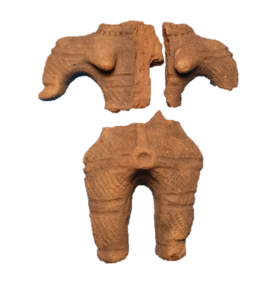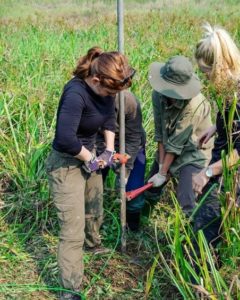My name is Emilie, and very soon, I will begin my PhD in Geoscience at The University of Aberdeen as part of the QUADRAT DTP. My project, entitled ‘Chronologies and Changing Cultures on the Mongolian Steppe’, will focus on using existing analysis alongside newly dated samples from both northern and southern Mongolia in order to produce a robust chronological model for which the chronological periods of the Mongolian Steppe can be mapped and synthesised. My supervisors for this project are Dr. Joshua Wright of the University of Aberdeen, and Professor Paula Reimer of the 14CHRONO Centre at Queen’s University Belfast.
Whilst my PhD is in Geoscience, with Geoscience being an essential part of my research, I am at heart an archaeologist. I started my Undergraduate degree in Archaeology in 2015 at Queen’s University Belfast, and, at that time, I had no clue where this path would take me – if anywhere at all. I had assumed that I would enjoy the experience, get my degree, and then perhaps start an office job. Instead, my experience at Queen’s University and in the ArcPal department went beyond all expectations; I was completely hooked and could no longer imagine myself pursuing any other career.

My research interest is primarily in human adaptations to changing environments, and the human capacity to adapt to change behaviourally; in the way we subsist, how we interact on a social level, but also in the way we adapt our material culture to these changes. In a time where the world around is in a constant state of rapid and unprecedented change, it has never been more important to understand past chronologies of change and human adaptation. As a species, we are experiencing cultural, social, and environmental change on a level never experienced before, therefore understanding the processes and trajectories of change in the past could not be any more crucial for informing future adaptation.
Growing up, I was always interested in learning about Asia. Encountering Asian culture and the ways in which its’ cultures were different from my own – both materially and socially – resulted in a fascination that will last a lifetime. So naturally, as I progressed through my Undergraduate degree, this fascination steered my research focus into Asia.
For my final year Undergraduate dissertation, I given the opportunity to conduct research as part of the SUNDASIA Project. The SUNDASIA Project, a multidisciplinary project based at Queen’s University, explores the adaptation of prehistoric tropical communities to cycles of coastal inundation of the last 60,000 years in the Tràng An Massif World Heritage site in Ninh Binh, northern Vietnam, in order to inform modern climate models and responses (see https://sundasia.com/). As part of this project, I received the encouragement and confidence to pursue a career in Archaeology, and began to refine my research interests.
My dissertation explored the application of archaeometric methods of analysis for the sophisticated study and residual analysis of pottery from the prehistoric Vietnamese Dabutian culture complex, in order to garner deeper insights into subsistence strategies. My research was spent both working in laboratories collecting data, and in the field gathering new ceramic samples.

In October 2019, I graduated with a Masters of Philosophy in Archaeological Research from the University of Cambridge. My dissertation, utilising non-destructive forms of geochemical analysis such as portable X-ray Fluorescence analysis, examined the geochemical variance within the clays of Japanese anthropomorphic clay figurines (known as Dogū) in order to explore patterns of fragmentation and movement of these figurines amongst complex hunter-gatherer groups (known as the Jōmon) who occupied the Japanese archipelago during prehistory.

During my Masters of Philosophy, I conducted research in Japan, where I worked with The Chiba Board of Education, The Chiba Cultural Relics and Restoration Centre, and The Sainsbury Institute for the Study of Japanese Arts and Cultures. It was an honour to work alongside my Japanese colleagues and to have been trusted with the analysis of these important cultural relics.
In 2019, I took a break from academia and university to spend a year teaching English in South Korea for the Korean National Commission for UNESCO. Whilst this was an extremely rewarding experience, I am excited to be back doing what I love.
Here’s to a new chapter!
























































